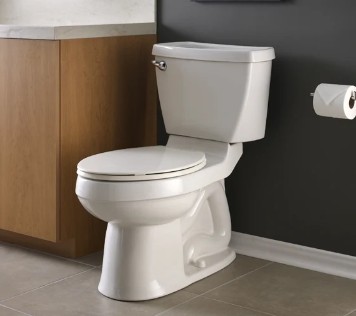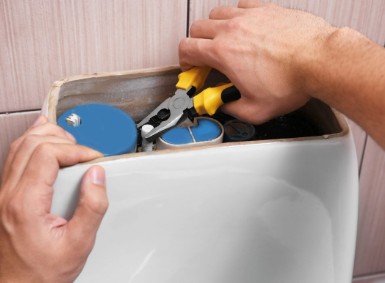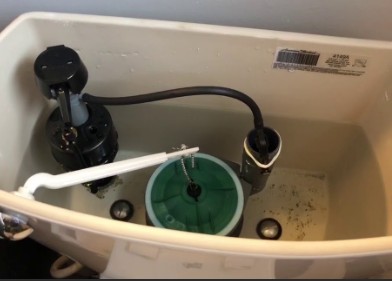When shopping for a toilet, there are things you wouldn’t want to compromise on; these include flushing power, comfort, and water efficiency.
American Standard ticks off these boxes and more, but they aren’t perfect, so this American Standard toilet troubleshooting guide is helpful.
Some issues you may encounter with your American Standard toilet are leaking, low water level, flapper chain problems, non-stop running, and flushing problems. Your toilet may also fail to fill, clog, or the tube or hose break.
Don’t be in a hurry to call a plumber because you can troubleshoot and fix most American Standard problems yourself. Below is a detailed walkthrough of these problems, their causes, and recommended fixes to aid your quest.

American Standard Toilet Troubleshooting (Problems & Fixes)
| Problem | Causes | Recommended Fixes | |
| 1. | Continuous toilet running | Worn-out flapper Damaged fill valve The water level set high | Replace the flapper Adjust the fill valve or replace it Adjust the chain and float |
| 2. | The toilet not filling properly | Debris buildup Damaged fill valve | Remove the debris Replace the fill valve |
| 3. | Clogging | Blockages lodged in the trap or drain pipe | Unclog using a plunger or snake |
| 4. | Leaking | Loose bolts Worn-out washers Broken supply line Cracked bowl or tank | Tighten the bolts Replace the washers Replace the supply line Get a new toilet |
| 5. | Ghost flushing | Broken or short chain Faulty flapper Faulty flush valve | Replace or reattach the chain Replace the flapper Replace the flush valve |
| 6. | Compromised slow close seat | Loose or worn-out hinges Loose bolts | Adjust the hinges Tighten the bolts |
| 7. | Overflowing | Broken tube or hose Clogging Worn-out flapper Damaged fill valve | Fix the tube or hose Clear clogs Replace flapper Replace fill valve |
| 8. | Toilet running intermittently | Low water level Faulty float cup or ball Leaky flush valve | Adjust water level Replace the float |
| 9. | Weak flush | Partial clog Worn-out flapper Faulty float Blocked rim jets Loose handle | Unclog your toilet Install a new flapper Adjust or replace the float Clean the rim jets Adjust the toilet chain |
| 10. | Toilet not flushing | Full clog Damaged fill valve or flapper Malfunctioning handle Low water level Damaged drain line | Unclog the toilet Replace the fill valve or flapper Reconnect the handle or replace it Adjust the water level Hire a plumber |
1. Continuous Running
When you push down your toilet’s handle or press the flush button, water from the tank flows to the bowl, removing the waste. Consequently, water flows into the tank to replace the space.
This is how a properly functioning toilet works, so if you find water running non-stop even after, you have an issue. This is a problem you must address because it causes water wastage.
The flapper is responsible for allowing water to flow into the toilet bowl upon flushing, so it must be in great condition. A faulty flapper lets water trickle into the bowl continuously.
While the flapper lets water flow into the toilet tank, the fill valve controls the amount of water going into the tank after a flush. A malfunctioning or poorly fitted fill valve can let the water keep flowing into the tank even after it’s full.
Fix
- Check whether the float is set too high. If set too high, water will flow into the overflow tube, and the fill valve may fail to shut off in return. Rectify this by adjusting the float until you get the perfect level
- Remove debris buildup on the fill valve using vinegar and a tiny brush
- Lower the fill valve’s height if set too high by turning the adjustment screw counterclockwise.
- Replace the fill valve if severely damaged
- Replace a worn-out flapper. An excellent choice would be the Toilet Flapper Replacement Kit (View on Amazon), which is long-lasting, corrosion-resistant, easy to install, and universally compatible with most American Standard models and other toilets.
2. The Toilet Not Filling Properly
Check the fill valve if your American Standard toilet develops issues filling up with water, perhaps taking too long for the tank to fill up or not filling up entirely. Such problems arise in a worn-out fill valve and debris buildup e after many years of up.
As you continue using your toilet, debris builds up over time in and around different parts, including the supply line, valve body, and shut-off valve. The buildup can inhibit water flow and slow down the valves’ functionality.
Fix
- Remove the debris from your toilet’s fill valve using vinegar and a brush
- Replace the fill valve if worn-out
3. Clogging
Your toilet can clog for different reasons, from using too much toilet paper to flushing things you aren’t meant to flush, like pads and baby wipes. Clogs can occur in various parts, such as the trap, vent pipe, drain line, and sewer line.
Fix
Some clogs are easier to fix than others. For instance, you’ll likely require plumbing services to fix a clogged sewer line.
Force clogs stuck in your toilet’s trap and drain line into the sewer line using a plunger. Alternatively, break up or extract the obstructions using an auger.

4. Leaking
A third of the water used inside homes goes to flushing toilets, so it’s essential to ensure your toilet is water-conserving and isn’t leaking anywhere. Besides wasting water, leaks can make your bathroom messy and cause water damage.
Leaks can occur due to leaky gaskets between the bowl and tank, a cracked bowl or tank, a bad connection in the feed line, and a worn-out wax seal. The toilet will leak from the bowl or tank if the flush valve gets loose.
Fix
- Tighten the nut holding the flush valve together if loose
- If the wax ring is cracked or worn out, you’ll require a replacement wax ring
- Replace the gaskets if the seals wear out, causing leaks between the bowl and tank
- If the cracks on the bowl or tank are minor, seal them using plumbing epoxy. Otherwise, start shopping for a new bowl, tank, or an entire toilet
5. Ghost Flushing
Ghost flushing doesn’t happen due to paranormal activity, so don’t freak out if your toilet flushes unprovoked. Typically, this problem is caused by a loose or broken flapper.
When the flapper wears out or gets loose, it stops working properly, causing the water to continue flowing into the bowl, eventually forcing the toilet to flush to keep it from overflowing.
Moreover, ghost flushing can happen due to a damaged flush valve by making the toilet mechanism believe the handle or button is being pushed constantly.
Fix
- Check whether the chain is the right length. If it’s short, loosen it
- Replace a worn-out flapper
- Install a new flush valve. The American Standard 3174105-0070A Champion Universal Replacement Flush Valve (View on Amazon) is an excellent choice. It’s easy to install and helps fix a running toilet
6. Compromised Slow Close Seat
Late-night trips to the bathroom are better for everyone living in your home when your toilet seat is slow close. This is because the seat will not slam; hence the noise of a closing toilet seat will not wake up or disturb anyone.
Therefore, it’s important to uncover the reason behind it when your American Standard toilet seat’s slow-close mechanism malfunctions. The causes include broken or loose hinges or loose bolts.
Fix
- Adjust the toilet seat hinges
- Locate and tighten the bolts keeping the seat in place using a screwdriver
7. Overflowing
If you find your toilet overflowing, the drain could be blocked or clogged, thus preventing the toilet from flushing well, or the fill valve or flapper could be worn-out. Alternatively, the tube or hose may be broken.
Water will overflow from the toilet bowl if the drain is clogged. On the other hand, the tank overflows if the float or flapper malfunctions.
Fix
- Put on disposable or rubber gloves, then fetch excess water in your toilet bowl using a tiny bucket or cup. Pour the water into a plastic bucket if dirty and the sink if clean
- Unclog the toilet using a plunger
- Retrieve obstructions that a plunger cannot handle using an auger
- Untangle a kinked chain
- Lower the float mechanism to the right height to keep the tank from overflowing
- Replace a worn-out flapper or fill valve
8. Toilet Running Intermittently
Unlike continuous running, phantom flushing happens randomly. Low water level, malfunctioning flapper, and a leaky fill valve commonly cause this issue.
Furthermore, the little shafts beneath the toilet tank may be screwed excessively far, slightly pressing the flush button, causing intermittent flushing.
Fix
- Adjust water level
- Replace the damaged fill valve or flapper
- Turn the shafts counterclockwise to relieve the pressure in the flush button

9. Weak Flush
It can be pretty frustrating when your once powerfully flushing American Standard toilet starts delivering a weak flush. You cannot depend on your toilet to eliminate waste after using the toilet if it produces a poor flush, so fixing this issue is paramount.
When faced with this problem, check the trap for clogs because a partial clog is a common cause. Furthermore, a weak flush can be caused by a worn-out flapper, faulty float, blocked rim jets, or a loose chain and handle.
Fix
- Dislodge clogs trapped inside the trap with a plunger or snake
- Scrub the rim jets using a small brush and vinegar to remove bacteria, debris, and mineral deposits embedded there
- Buy and install a quality flapper if the current one is worn-out and no longer provides a water-tight seal
- Raise the height of the float to ensure sufficient water flows into the tank
- Replace a damaged float
10. Toilet Not Flushing
You will likely deal with a toilet that won’t flush at some people seeing it’s a common problem. If the handle doesn’t go down when you push it down, it’s probably disconnected.
Also, the toilet will not have sufficient water to flush if the water level is excessively low. Your toilet may fail to flush if fully clogged or the flapper is cracked or bent.
Fix
- Check the handle and chain for loose connections and whether they are disconnected. Tighten loose nuts and reconnect the handle and chain
- Tweak the adjustment screw to raise the water level to around 1 inch below the overflow tube
- Install a new flapper
- Eliminate clogs using a snake or plunger
Final Remarks on American Standard Toilet Troubleshooting
When faced with issues in your American Standard toilet, consider making the repairs yourself before seeking plumbing services. However, don’t go blindly; the guide above provides the information you require to troubleshoot various American Standard toilet issues.
Here are other interesting topics:
